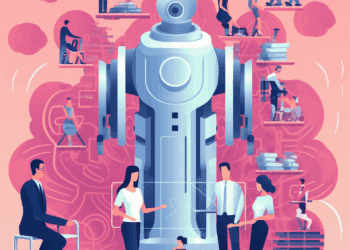In an age increasingly defined by rapid technological advancement, from ubiquitous Artificial Intelligence to immersive virtual worlds, the ethical implications of our digital footprint are more critical than ever. As technology permeates every facet of our lives, from personal interactions to global governance, the imperative for a robust framework of digital ethics is undeniable. It’s no longer enough to simply innovate; we must innovate responsibly, ensuring that technological progress serves humanity and upholds fundamental values. This comprehensive article delves into the core principles of digital ethics, exploring its foundational concepts, the pervasive challenges posed by emerging technologies, the strategies for fostering responsible innovation, and the societal imperative for continuous adaptation.
What is Digital Ethics?

At its essence, digital ethics is a branch of ethics that examines and evaluates the moral problems that arise from the development, application, and impact of digital technologies. It’s about asking crucial questions like: Just because we can build something, should we? How do we ensure technology respects human dignity, privacy, and fairness? It goes beyond legal compliance, delving into the moral obligations of developers, companies, governments, and users in the digital realm.
Digital ethics encompasses a wide range of considerations, including:
- Privacy and Data Protection: How personal data is collected, stored, used, and shared, and ensuring individuals maintain control over their information.
- Bias and Fairness in AI: Addressing inherent biases in algorithms and data that can lead to discriminatory outcomes, ensuring AI systems treat all individuals equitably.
- Accountability and Transparency: Who is responsible when autonomous systems make mistakes? How can we understand the decision-making processes of complex algorithms?
- Digital Divide and Access: Ensuring equitable access to technology and its benefits, preventing the creation of new forms of social inequality.
- Human Autonomy and Agency: How technology influences human behavior, decision-making, and the very nature of human interaction, ensuring it enhances rather than diminishes human agency.
- Cybersecurity Ethics: The moral obligations related to protecting digital systems from malicious attacks, balancing security with privacy rights.
- Environmental Impact: Addressing the energy consumption and environmental footprint of data centers, AI training, and technology manufacturing.
The complexity of digital ethics arises from the rapid pace of technological change, which often outstrips our ability to establish clear ethical guidelines and societal norms.
The Ethical Minefield
The very technologies driving our digital transformation also present the most significant ethical dilemmas, demanding careful consideration and proactive solutions.
A. Artificial Intelligence (AI) and Machine Learning (ML)
AI’s ability to learn, decide, and act autonomously brings forth profound ethical questions.
- Algorithmic Bias: If AI models are trained on historical data that reflects societal biases (e.g., racial, gender, socioeconomic), the algorithms will learn and perpetuate these biases. This can lead to discriminatory outcomes in areas such as hiring, loan approvals, criminal justice, or even medical diagnoses.
- Lack of Transparency (Black Box Problem): Many advanced AI models, particularly deep learning networks, are so complex that even their creators struggle to fully understand how they arrive at specific decisions. This “black box” nature makes it difficult to audit, explain, or rectify errors, especially in high-stakes applications.
- Accountability: When an autonomous AI system makes a mistake or causes harm (e.g., an autonomous vehicle accident, an AI-driven medical misdiagnosis), establishing who is responsible (developer, deployer, user) is a complex legal and ethical challenge.
- Privacy Violation: AI requires vast amounts of data. The collection and analysis of this data, especially through facial recognition, sentiment analysis, or behavioral profiling, can lead to pervasive surveillance and erosion of individual privacy.
- Job Displacement: AI-powered automation will undoubtedly automate many tasks, potentially leading to widespread job displacement and the need for significant societal restructuring and workforce reskilling.
- Autonomous Weapons Systems (Killer Robots): The ethical implications of delegating life-and-death decisions to autonomous AI systems without meaningful human control are a highly contentious and deeply concerning area.
B. Big Data and Data Analytics
The sheer volume, velocity, and variety of data, combined with advanced analytical capabilities, create unprecedented ethical challenges related to privacy and manipulation.
- Privacy Erosion: Ubiquitous data collection from devices, online activities, and physical spaces leads to detailed digital profiles, making it increasingly difficult for individuals to control their personal information and raising concerns about pervasive surveillance.
- Data Brokering and Monetization: The sale and sharing of personal data by data brokers and companies, often without explicit and informed consent, raises questions about who truly owns and benefits from personal information.
- Algorithmic Discrimination: Large datasets, even if seemingly anonymized, can be used to identify and target individuals or groups for manipulative purposes, or to perpetuate discriminatory practices through scoring and profiling.
- Misinformation and Disinformation: Data, especially when manipulated or combined with generative AI, can be used to create and spread misinformation and disinformation at scale, impacting public opinion, democratic processes, and social cohesion.
- Re-identification Risk: Even if data is anonymized or pseudonymized, sophisticated analytical techniques can sometimes re-identify individuals by combining disparate datasets.
C. Internet of Things (IoT)
The proliferation of interconnected devices in our homes, cities, and industries brings new ethical considerations related to security, privacy, and control.
- Pervasive Surveillance: Smart devices (cameras, microphones in smart homes, sensors in smart cities) constantly collect data about our lives, blurring the lines between convenience and pervasive surveillance.
- Security Vulnerabilities: Many IoT devices are designed for low cost and lack robust security features, making them vulnerable to hacking, which can expose personal data, create botnets, or even lead to physical harm (e.g., compromised medical devices or smart home locks).
- Data Silos and Ownership: Who owns the data generated by a smart appliance? The user? The manufacturer? The service provider? Lack of clarity can lead to opaque data practices.
- Consent Fatigue: Users are constantly asked for consent for data collection from various IoT devices, leading to “consent fatigue” where individuals click “accept” without fully understanding the implications.
- Physical Safety Risks: A compromised IoT device in critical infrastructure (e.g., smart grids, industrial controls) could have severe real-world physical consequences.
D. Augmented Reality (AR) and Virtual Reality (VR)
As AR/VR create increasingly immersive digital worlds, new ethical dilemmas arise concerning psychological well-being, identity, and data.
- Psychological Impact: Prolonged or intense immersion in VR could lead to digital addiction, disorientation, or difficulty distinguishing between virtual and real experiences, impacting mental health.
- Identity and Avatars: The ability to create highly customizable avatars and digital identities in virtual worlds raises questions about authenticity, misrepresentation, and the potential for new forms of online harassment or impersonation.
- Biometric Data Collection: Advanced AR/VR headsets collect highly sensitive biometric data (eye movements, facial expressions, physiological responses) that can infer emotions, cognitive states, and personal preferences, raising profound privacy concerns.
- Virtual Harassment and Assault: The heightened sense of presence in immersive social VR spaces can make experiences of harassment or assault feel more visceral and psychologically impactful.
- Manipulation of Perception: AR can subtly alter our perception of reality by overlaying digital information. This raises concerns about targeted advertising, misinformation, or even manipulation of our cognitive processes.
- Ownership of Virtual Assets: As digital assets (NFTs for avatars, virtual land) gain real-world value, questions about ownership, intellectual property, and inheritance in virtual spaces become increasingly complex.
E. Blockchain and Decentralized Technologies (Web3)
While promising decentralization, Web3 technologies introduce their own unique ethical considerations.
- Environmental Impact (Proof-of-Work): Some blockchain consensus mechanisms (like Bitcoin’s Proof-of-Work) consume vast amounts of energy, raising significant environmental concerns.
- Accountability in Decentralization: In Decentralized Autonomous Organizations (DAOs) or other decentralized systems, establishing clear accountability when things go wrong can be difficult due to the lack of a central authority.
- Illegal Activities: The pseudonymous nature of some blockchain transactions can be exploited for illicit activities like money laundering, terrorist financing, or sanctions evasion.
- Digital Divide: Access to cryptocurrencies, NFTs, and participation in DAOs often requires technical literacy and financial resources, potentially exacerbating existing digital divides.
- “Code is Law” vs. Human Ethics: The principle that “code is law” in smart contracts can lead to situations where technically correct but ethically problematic outcomes occur, with no easy recourse.
Strategies for Digital Ethics

Addressing these complex ethical challenges requires a multi-faceted approach involving technology design, policy, education, and societal engagement.
A. Ethical AI Design and Development
- AI Ethics Guidelines and Principles: Developing and adhering to clear ethical principles for AI design (e.g., fairness, transparency, accountability, human oversight, privacy, safety). Many organizations and governments are establishing these.
- Bias Detection and Mitigation: Implementing tools and methodologies to actively detect, measure, and mitigate algorithmic bias throughout the AI development lifecycle, from data collection to model deployment.
- Explainable AI (XAI): Researching and developing techniques to make AI models more transparent and interpretable, allowing humans to understand why an AI system made a particular decision, especially in critical applications.
- Privacy-Preserving AI: Developing AI techniques that can learn from data without directly exposing sensitive individual information (e.g., federated learning, differential privacy).
- Human-in-the-Loop: Designing AI systems that include meaningful human oversight and intervention points, ensuring that critical decisions are ultimately made or approved by humans.
B. Robust Data Governance and Privacy Frameworks
- Strong Data Privacy Regulations: Implementing and enforcing comprehensive data protection laws (like GDPR, CCPA) that give individuals rights over their personal data, including the right to access, rectify, erase, and opt-out of data collection.
- Privacy-by-Design and Default: Integrating privacy considerations into the very architecture of systems and services from the outset, rather than as an afterthought. Making privacy-protective settings the default option.
- Transparent Data Practices: Clearly communicating to users what data is collected, why it’s collected, how it’s used, and with whom it’s shared, using clear, understandable language.
- Data Minimization: Collecting only the data that is strictly necessary for a specific purpose, and deleting it when no longer needed.
- Secure Data Storage and Processing: Implementing robust cybersecurity measures to protect data from breaches, unauthorized access, and manipulation.
C. Policy, Regulation, and Legal Frameworks
- Proactive Regulation: Governments and international bodies need to develop agile and adaptive regulatory frameworks that can keep pace with technological advancements, addressing emerging ethical challenges before they cause widespread harm.
- International Collaboration: Given the global nature of digital technologies, international cooperation is essential for establishing consistent ethical norms and regulatory standards.
- Independent Oversight Bodies: Establishing independent ethical review boards or regulatory bodies to oversee the development and deployment of high-risk AI and other emerging technologies.
- Legal Accountability: Developing clear legal frameworks to assign responsibility when autonomous systems cause harm, ensuring victims have avenues for redress.
D. Education, Awareness, and Public Discourse
- Digital Literacy Education: Equipping individuals with the knowledge and skills to understand the ethical implications of digital technologies, protect their privacy, and critically evaluate online information.
- Ethical Training for Technologists: Integrating ethics into computer science curricula and providing ongoing ethical training for professionals involved in the design, development, and deployment of technology.
- Multi-Stakeholder Dialogue: Fostering ongoing dialogue and collaboration among technologists, ethicists, policymakers, civil society organizations, and the general public to shape ethical norms and responsible innovation.
- Promoting Critical Thinking: Encouraging critical thinking skills to help individuals discern misinformation, recognize algorithmic manipulation, and make informed choices about technology use.
Conclusion
The emergence of digital ethics is not merely an academic exercise; it is a critical societal imperative for navigating the complexities of our increasingly technologically driven world. As Artificial Intelligence, Big Data, IoT, AR/VR, and blockchain continue to reshape every facet of human existence, the moral choices embedded in their design, deployment, and use will profoundly impact privacy, fairness, autonomy, and trust. Understanding these ethical dimensions is no longer optional but essential for individuals, corporations, and governments alike.
However, the journey towards an ethically sound digital future is a continuous one, demanding vigilance, collaboration, and proactive adaptation. Addressing the formidable challenges of algorithmic bias, data privacy, security vulnerabilities, and ensuring equitable access to technology requires a multi-stakeholder approach. By fostering open dialogue, implementing responsible design principles, and advocating for thoughtful regulation, we can ensure that technological progress truly serves humanity, fostering innovation that is not only powerful but also just, equitable, and aligned with our deepest values. Digital ethics isn’t just emerging; it’s shaping the very foundation of our shared digital future.












